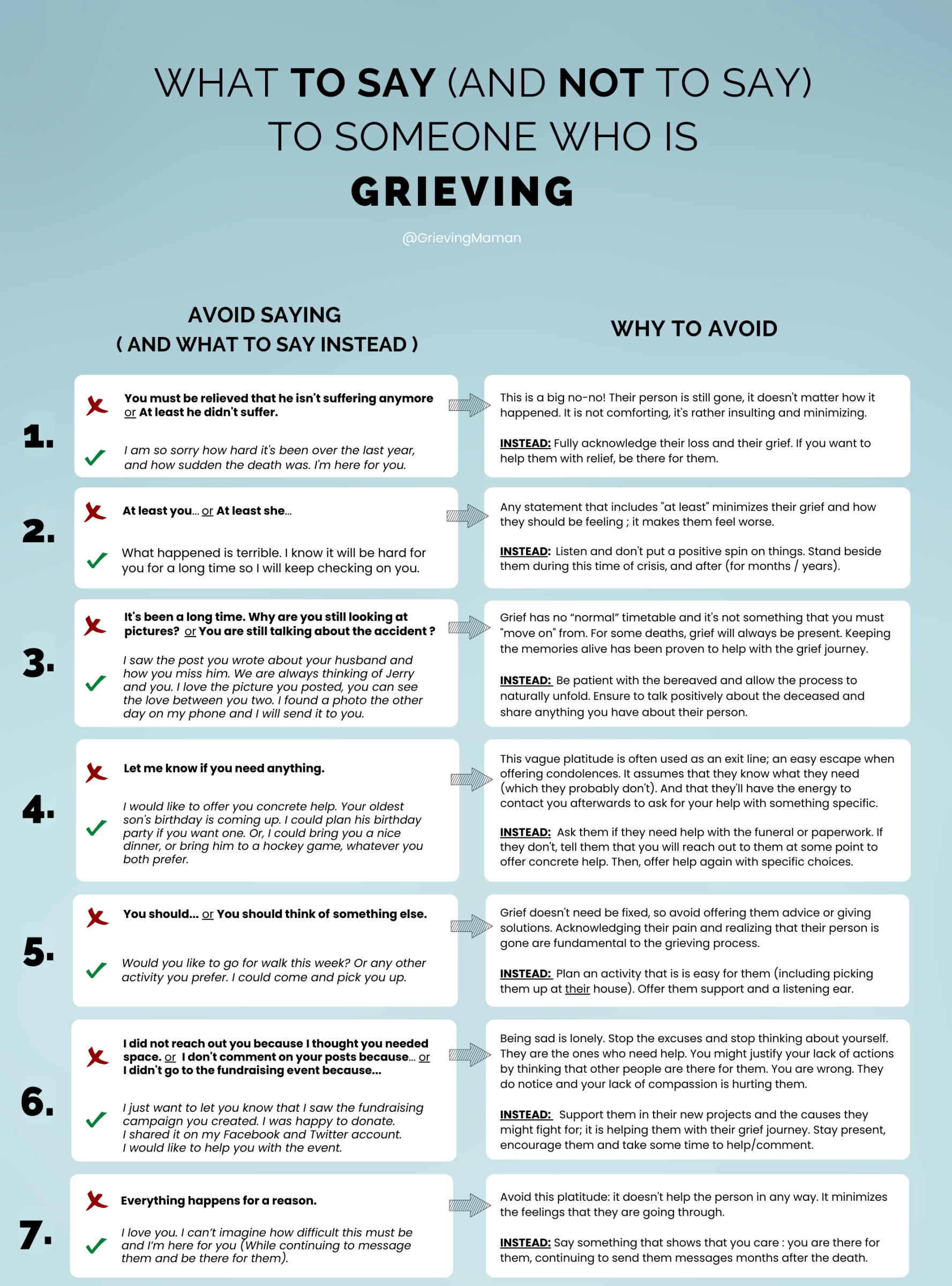Pour la version originale de cette publication (version française), cliquez ici.
When talking to someone who is grieving, it can be hard to know what to say. In my previous post, I shared 10 of the worst things to say to someone who is grieving. As promised, today’s post will include concrete examples of what to say instead.
The infographic includes 15 “Not to Say” expressions. On the right, we find the reasons why they should be avoided. The green checkmarks represent better alternatives to help a grieving person.
Excerpt from Infographic (Example #1)

Our job as a support person is not to cheer them up. Why? Because it won’t work, grief is not to be fixed. The best way to help them in their journey is to be supportive and to listen.
Afraid of saying the wrong thing so you decide to simply not reach out?
“After all, some people are better than me at those things, they have other people” you might think. Again, not the solution. Your absence by not talking or not writing to them messages will hurt them even more. This is especially if you are a close family member or close friend; even if they have other people. Thus, they will think that you don’t care.
Grief awareness and empathy are key to help someone who is grieving
Hopefully, the examples below will help you feel more confident when reaching out. Let’s not forget that grief doesn’t only last a couple of weeks. It might in some cases, but often, grief can last years, maybe even forever. This is usually the case for the death of a young spouse or child. As long as their person remains significant, grief will remain. Which means that you should say and do the things (with the green checkmark) for years to come. It is never too late.
What not to Say – and What to say instead
The expressions below should be avoided, unless they are used by the bereaved themselves. Even then, we have to be careful. For example, they might say “One day at a time” to explain their own grief journey, but that doesn’t mean these words will be comforting coming from others.
The infographic also shows alternatives the bereaved would prefer to hear, as well as tips on how to be more empathetic. These examples might also become useful if you are ever around someone who is sick or if their loved one is sick.
Note: To view the infographic to its full width on a mobile device, rotate the device to a landscape view (orientation).
15 Things to Avoid Saying to a Grieving person
AND Better Alternatives


Religious statements have not been included above, but they should also be avoided ; unless you are 100% certain that the bereaved shares your faith and afterlife beliefs. Examples include : “He’s in a better place now,” “He’s with grandpa now”, “It was God’s plan,” “God wanted him up in heaven”, “May God walk beside you and guide you through” and “You’ll see her again someday.”
That’s it for now!
Do you have any thoughts about any of the examples above?
Please share them in the comments below.
If you would like to receive our next post, you can click “Follow by email”.
Or you can send us a message and we will send you an invitation!
References :
What to say and what not to say to someone who is grieving : https://www.nytimes.com/2019/02/14/smarter-living/what-to-say-and-what-not-to-say-to-someone-whos-grieving.html
Cinq fausses croyances au sujet du deuil (French) : https://www.fcfq.coop/chroniques/cinq-fausses-croyances-sujet-deuil-2408/
Ce qu’on peut dire et ne pas dire pour présenter des condoléances (French) : https://meilleures-pompes-funebres.com/conseils/ce-quon-peut-dire-et-ne-pas-dire-pour-presenter-des-condoleances

Leave a Reply